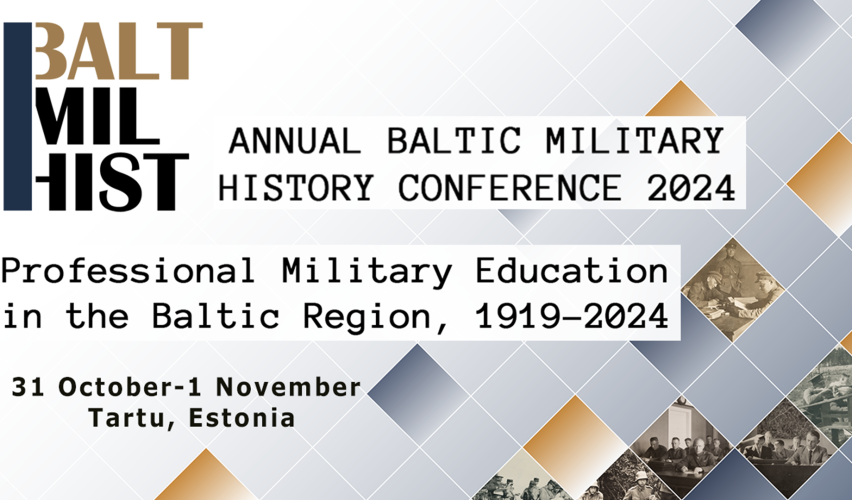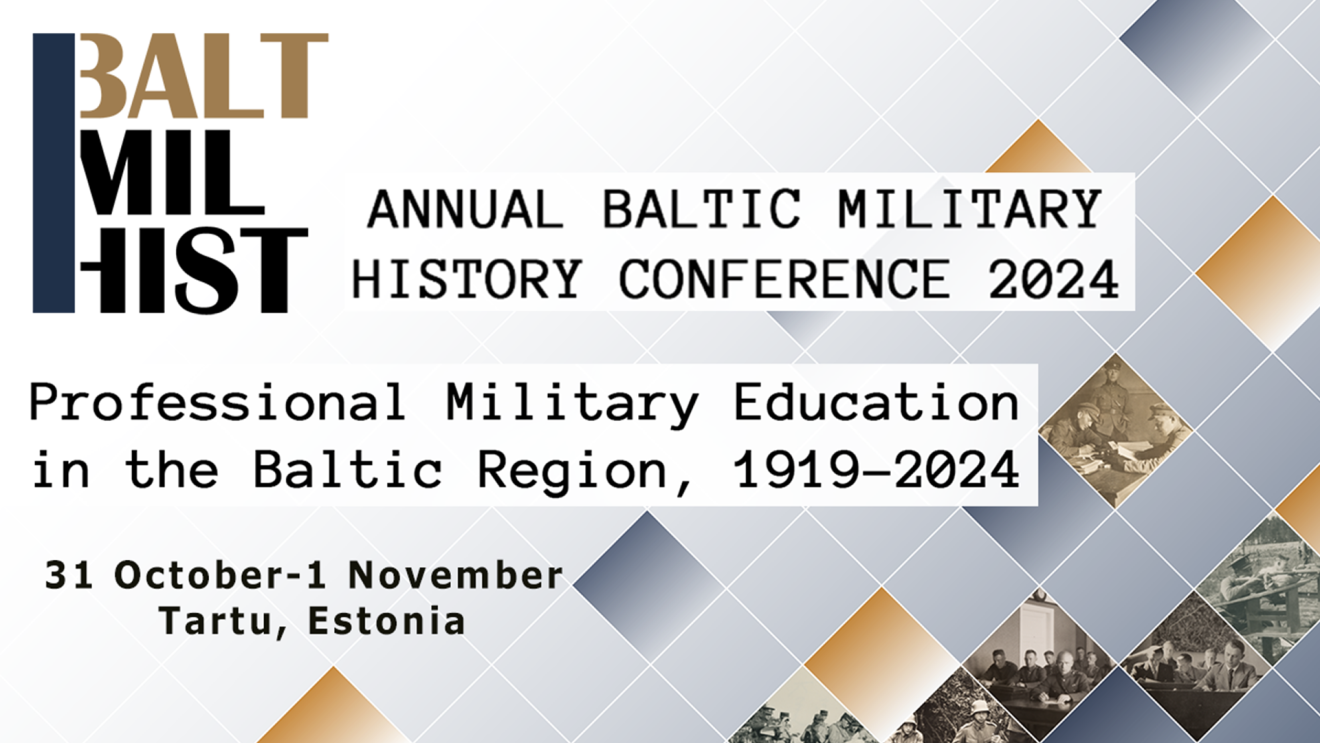
15th annual Baltic military history conference “Professional Military Education in the Baltic Region, 1919–2024”
15. annual Baltic military history conference “Professional Military Education in the Baltic Region, 1919–2024” was held on 31 October and 1 November 2024 in University of tartu Library and online. Programme and registration on conference homepage baltmilhist.eu.
Professional military education in the Baltic countries is around 200 years old. It was established during the Russian Empire already. There was a department of military science at the University of Tartu at the beginning of the 19th century, and a military school was founded in Vilnius in 1864. The characteristics of professional military education underwent great changes before the Great War, between 1919 and 1940, and during and after the Cold War.
Officer training and military education in the independent Baltic countries began during their wars of independence in 1919. It was initially designed to satisfy wartime needs. In the 1920s, military education had to be reorganized for peacetime conditions. The vision for professional military education was multifaceted, from educating cadets to developing strategic thinking and planning. Higher military officers constantly placed a great emphasis and high expectations on military education, and these small states could not afford “idleness”. In addition, the expectations on professional military education were driven by constant change. There were many reasons for this dynamic: primarily, these were peacetime changes, but they were affected by the turmoil caused by the great depression and the threat of World War II. Defence planning and doctrinal changes had a significant influence as well.
During the Second World War, most higher and senior officers of the armies of the Baltic states were imprisoned by the Soviet state security agencies after the occupation of the Baltic states. They were either sentenced to death or long years of imprisonment in the GULAG. On the other hand, there were a lot of officers, mostly junior grade, who fought in the Red Army, the German Army, or the Finnish Army. Their educational background affected their performance on the battlefield.
After the restoration of independence of the Baltic states at the beginning of the 1990s, the re-establishment of the institutions of military education was initially formulated in their individual national contexts. For example, strong influences came from the Nordic countries (Denmark, Finland, and Sweden) and other states. Professional military education gradually recovered, and one of its results was the Baltic Defence College, which recently celebrated its 25th anniversary.
Programme
OCTOBER 31
9:00-9:30
Registration
9:30-9:45
Opening of the Conference
BG Alvydas Šiuparis (Baltic Defence College) Mr Hellar Lill (Estonian War Museum)
Welcoming remarks by the Commandant of the Baltic Defence College (BALTDEFCOL) and the Director of the Estonian War Museum
9:45-10:15
Keynote Speech
Keynote speaker Mr Jānis Garisons
10:15-11:15
Panel 1: Keynote Panel
Mr Jānis Garisons
MG Ilmar Tamm (Estonian Defence League)
BG Alvydas Šiuparis (Baltic Defence College)
25 Years of the Baltic Defence College and Its Place in PME
Moderator: COL (ret) Dr (hab) Zdzisław Śliwa (Baltic Defence College)
11:15–11:30
Coffee Break
11:30-13:00
Panel 2 : Developments in the Contemporary PME in the Baltics
Dr Laima Bucevičiūtė (Vytautas the Great War Museum)
Changes in the Education of the Lithuanian Army During the Period of Accession to NATO
Ms Nele Rand, MA (Estonian Military Academy)
Military Education System for a Small-State Army – Estonian Case
Dr Martin Nassua (German Institute for Defence and Strategic Studies (GIDS), Helmut Schmidt University / University of the Bundeswehr Hamburg, Command and Staff College of The Bundeswehr)
Professional Military Education in Germany, 1919–2024
Moderator: Mr Hellar Lill (Estonian War Museum)
13:00-14:00
Lunch
14:00-15:30
Panel 3: Military Education in the Baltics During the Interwar Period
Dr Igor Kopõtin (Estonian Military Academy)
Russian Influences on the Estonian Military Education in the Early 1920s
LTC Rauno Viitmann, MA, (Estonian Military Academy)
The Influence of the French École Supérieure de Guerre on Estonian Military Education and Doctrine During the Period 1920-1940
Dr Kārlis Dambītis (National Defence Academy of Latvia / Museum of the Occupation of Latvia)
Military Education in Latvia 1919–1940: Transforming With the New Era
MAJ (ret) Dr Gintautas Jakštys (General Jonas Žemaitis Military Academy of Lithuania)
Training a New Type of Officer at the Lithuanian Military School 1919–1940
Moderator: Mr Art Johanson (Baltic Defence College)
15:30–15:50
Coffee Break
15:50-17:20
Panel 4: Experiences of Professional Military Education
Mr Valdis Kuzmins, MA (National Defence Academy of Latvia)
Creating “Mobile Corps”: the Latvian Army’s Attempt to Train Elite Units
Dr Eric Sibul
The Estonian Armed Forces and Battlefield Staff Rides
Dr Juris Ciganovs (Latvian War Museum)
Training of Latvian Army Officers-Specialists at the University of Latvia (1922-1940): Military Polytechnic Courses
Moderator: Tae Hoon Kim (Swedish Defence University)
NOVEMBER 1
09:00-10:00
Coffee & Gathering
10:00-11:30
Roundtable Discussions
On the second day of the conference, there will be round table discussions for invited guests and speakers. Further cooperation and possible joint projects will be discussed there.With more partners, developing international cooperation and coordinating activities is necessary for future projects.

